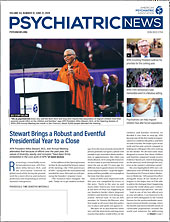“The separation of migrant children from their parents on the U.S. Southern border is one more of many traumas in their short lives. Its impact can be overcome only with long, slow work by mental health professionals,” said child trauma expert Alicia Lieberman, M.D., during an APA Annual Meeting session on the mental health consequences of migrant family separations.
“Normally, parents are a protective shield to moderate the impact of trauma. But at the border, parents are deprived of that function and are made to be perpetrators of abandonment, and a child cannot fathom that,” said Lieberman, a professor of medical psychology at the University of California, San Francisco, and director of the Child Trauma Research Program at San Francisco General Hospital.
Contemplation of what happens at the border seesaws between a focus on the individual child and the greater social and political forces that brought the family and child to that moment of crisis, said Lieberman. Many experienced violence in their home countries and along their route north. They are further traumatized while crossing the border and again once inside the United States.
Emotionally, when children are detained, they have no stable surrogate attachment figure.
Lieberman recounted several cases in which separation at the border left young children fearful, resentful, hopeless, and detached from their parents. Some may harbor revenge fantasies. Parents usually feel guilty. “Reunion does not undo the negative sequelae of separation,” she said.
Clinicians must be aware of that background and acknowledge the limitations of clinical practice in the face of those social and political conditions. Helping those children is a long, slow process, said Lieberman.
“We start treatment with a foundational series of four to six sessions in which we just talk so the patient gets to know the therapist,” she said. “The person must trust that we can tolerate hearing about their trauma.”
Once that trust has developed, Lieberman and her colleagues do systematic screenings for trauma. She may hold parent-child therapy sessions to address the child’s pathogenic beliefs. Sometimes she explains to the child that “adults may fail even when they try, but they will keep trying.”
The present crisis has spurred organizations with legal, child welfare, policy, and clinical orientations to work more closely together, she said.
“In the best interests of society, we need a supra-clinical approach to the problems of migrant children and their families that includes attention to their health, education, employment, and material needs both in their countries of origin and in the United States,” she said. ■

